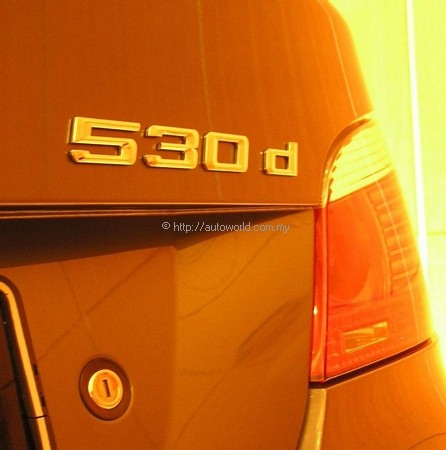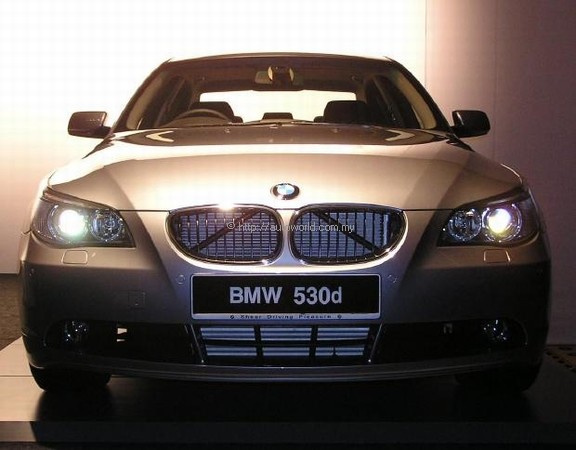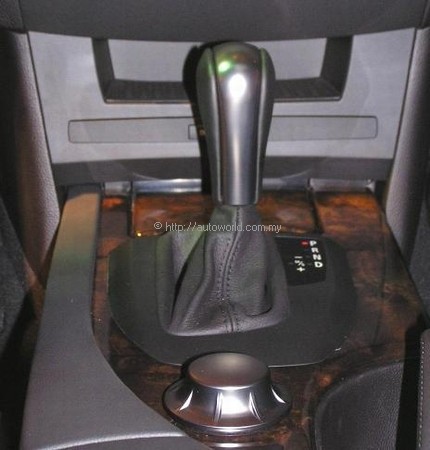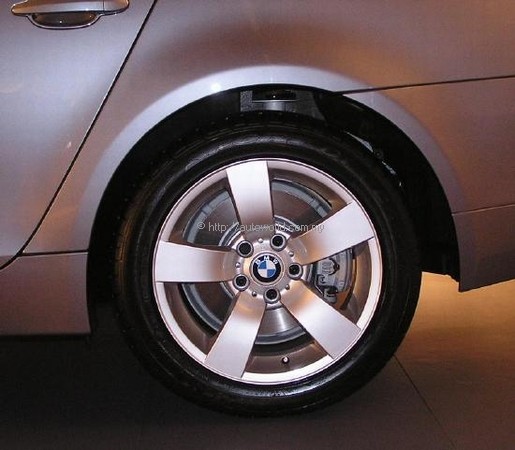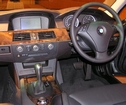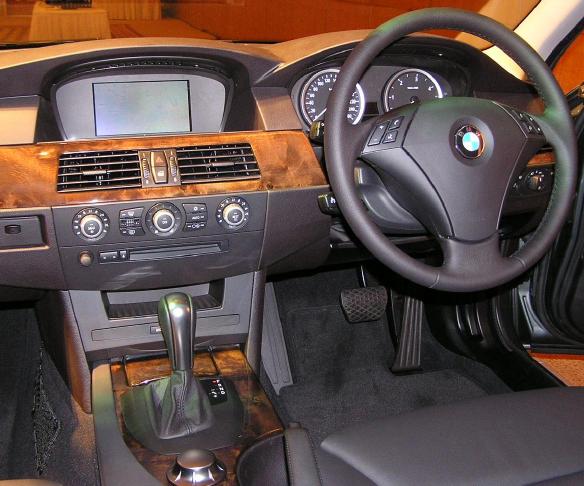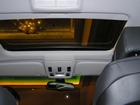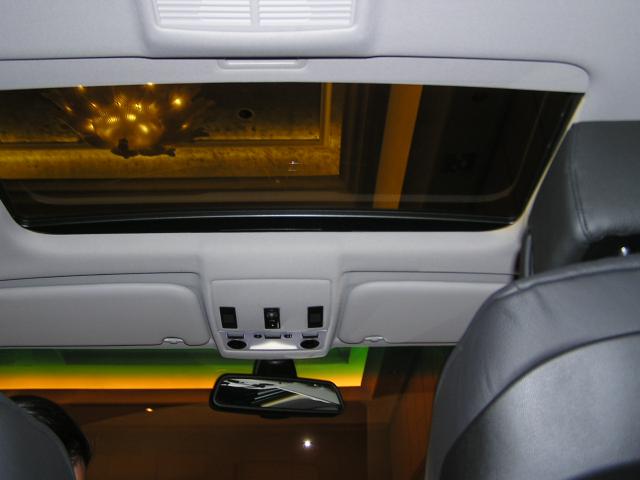BMW 530d
BMW. Diesel. The purists would consider the two as incompatible as oil and water. Yet BMW as well as other luxury carmakers are rolling out more and more diesel-engined models because buyers in Europe appreciate the benefits of a diesel engine, more so with the latest technologies which offer refinement and high performance.
Of course, the guardians of the BMW brand in Munich would not allow a diesel model in the range if it threatened to spoil the image and just as Land Rover would not offer a small SUV till they could make it be as capable as a true Land Rover (which they finally did in the Freelander), BMW would not sell a car with a diesel engine which did not offer the dynamic character that has been a hallmark of its products.
And BMW is no newcomer to making diesel models either, having started offering them 24 years ago and last year, almost a third of its cars sold had diesel engines. It has a diesel variant in almost all the series – right up to the flagship 7-Series which, in UK, is expected to account for 40% of sales of the series this year. In fact, between 1998 and 2002, sales of BMW cars with diesels increased by 150% and as an example of just how popular these variants are, 45% of BMWs sold in Europe in 2002 had diesel engines.
In Malaysia, luxury diesels are still new and Mercedes-Benz – which has a strong diesel history – has been trying to get people interested in its CDI technology. But even though everyone who has driven a Mercedes CDI has been greatly impressed and even amazed, the actual sales have not been anything to get excited about. The customers will sing praises about the car but when asked to consider buying one, the response is often: “But it’s a diesel…”. And there lies the obstacle to increasing the popularity of diesels in Malaysia – image.
Malaysians still cannot bring themselves to accept diesels in the same light as petrol engines even though they do understand that today’s diesels are a whole lot better – even cleaner – and that they are so cheap to run (only 76 sen a litre!). It’s the ‘oil and water’ thing and for those who buy premium brands especially, a diesel just is not on.
Well, BMW Malaysia believes that it can change that perception with its new 530d which goes on sale from March 19 with a pricetag of RM428,000 (excluding insurance). This is the first time the German carmaker is officially selling a diesel model here although there have been some units imported privately since the 1980s when BMW started making them.
Wolfgang Schlimme, BMW Malaysia’s MD, believes that BMW can achieve what Mercedes-Benz has not and popularize the luxury car with a diesel engine. He himself is a fan of BMW diesels, having owned a few before and he has already swopped his 745iL company car for a 530d.
“We are proud that BMW Diesel Technology is widely recognized as among the best, if not the best, in the world. Since development of such engines by BMW started 24 years ago, it has advanced tremendously and the one powering the new 530d is undoubtedly the best in its class,” he said during the media preview today.
Explaining the reason for introducing this variant, Mr Schlimme said that it has come from ‘listening to our customers and understanding what they want and expect from BMW’. He said that there had been a number of requests from customers who had been to Europe and driven BMW diesel models and were greatly impressed and wanted to buy them here, so BMW Malaysia has decided to offer them
However, he emphasizes that the introduction of the 530d should not be an indication of BMW ‘going diesel’. It is just another option that will enable the company to gain more market share in the segment. Depending on how the 530d does, there is the possibility that other model series will also be offered with diesel variants.
While acknowledging that there is an issue of image, he also feels that BMW can successfully introduce a luxury diesel model because the company has credibility and a strong technological platform. “BMW is clearly recognized as the leader in the field of diesel technology research and application and the 530d is the result of that leadership,” he proclaimed.
The 530d being introduced is a CBU model and shares identical equipment levels as the 530i. These include a sunroof, bi-xenon headlights which can swivel as the car goes round corners, eight airbags, 10-speaker audio system, Bluetooth mobilephone interface, and run-flat tyres on 17-inch wheels.
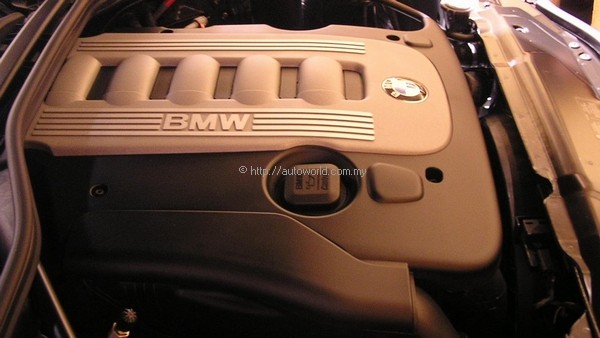 |
Of course, it is the heart of the 530d that is the key feature: an in-line 6-cylinder turbodiesel with a 2993 cc displacement. With an output of 160 kW/218 bhp and a massive 500 Nm of torque, this is one of the most powerful high-performance 6-cylinder engines currently available (at the moment, only the 7-Series has this engine). That 500 Nm of torque is available from 2000 – 2750 rpm, by the way.
Together with the 6-speed automatic transmission and numerous weight-reducing strategies in the car, the 530d is claimed to be able to sprint from standstill to 100 km/h in 7.3 seconds and attain a top speed of 243 km/h. On a full tank of 70 litres (which only costs RM53.20!), the 530d should be able to have a range of over 1100 kms as its best fuel consumption is 15.8 kms/litre (44.6 mpg).
The technology that allows the 530d to be so impressive is primarily the second-generation common rail fuel injection system. The common rail, as the name indicates, is a common pressure vessel for all six cylinders which delivers diesel to the injectors at a high pressure of 1,600 bar. It feature a volume control to accelerate the injection process and atomise the fuel more effectively to optimize combustion.
The ability to inject fuel several times per operating cycle (through micro-hole injectors with optimized jet openings) means that the conflict of interests between power, performance and noise control can be addressed much more effectively than before. Additionally, particulates are lowered so the generation of harmful pollutants in the exhaust gases is low enough to qualify the engine in the Euro-3 emission control standard.
Of course, diesel fuel quality is still an issue and those who own diesels in Malaysia often lament about the inferior quality of the fuel. The oil companies say that it is a ‘government matter’ and suggest that fuel quality could be higher if the government reviews the matter with regards to costs. However, because of the high subsidy for diesel fuel (this is because diesel fuel is used primarily by industries), the government is still not taking any steps to review the matter.
Nevertheless, Mr Schlimme said that BMW had done extensive testing with local fuels and has tuned the 530d’s engine to run optimally. He is confident enough that there should not be any problems for the engine and added that there is the proper tropical specification for the officially imported units (an indirect reference to those ‘other units’ which comes in through other channels which have engines not equipped for hot climates). As he is going to be using one himself, he will obviously become personally aware of problems, should there be any, so those who intend to buy a 530d can take comfort in that fact!
He won’t say how many units the company will sell here (Malaysia is the only country in ASEAN to have this 5-Series variant) but suggested that it could account for 20% of 5-Series sales in Malaysia. It’s a gamble, of course, but the Germans are well known for doing their homework well and only embarking on something when they figure they have got all the sums right.
“BMW aims to be No 1 in the Malaysian premium car segment and we want to reiterate that aim. The addition of the 530d reflects just that – our vision to become No.1 We are not here to be a comfortable No. 2,” Mr Schlimme said.
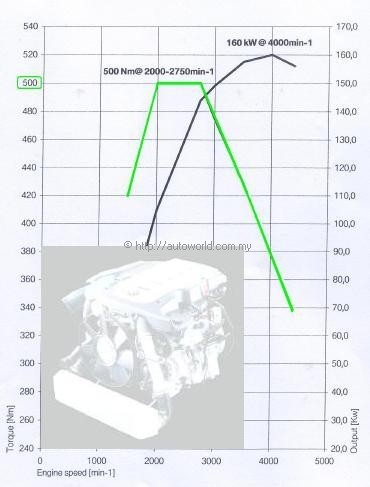 |
| 500 Nm available from 2000 rpm! |




